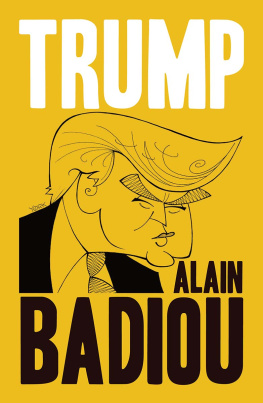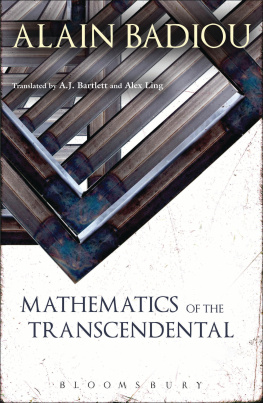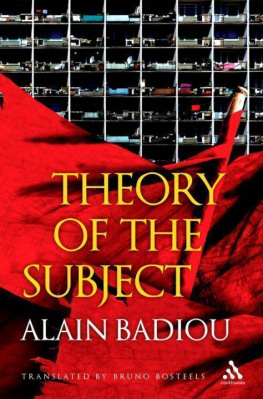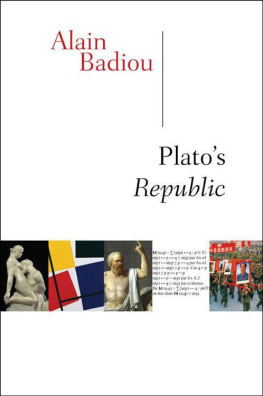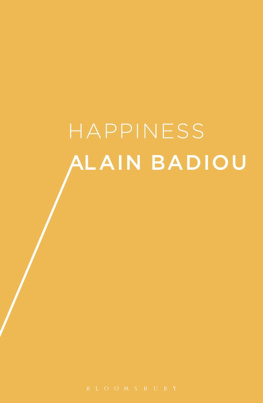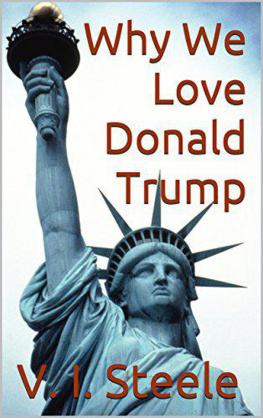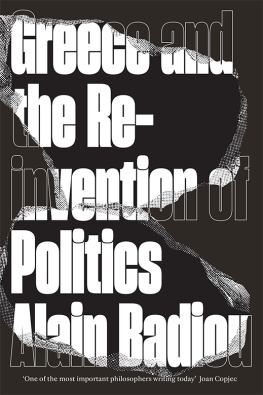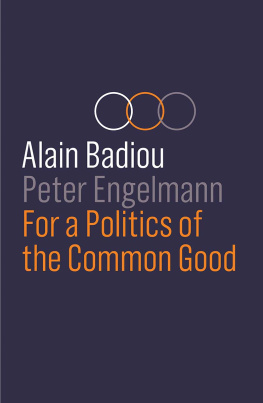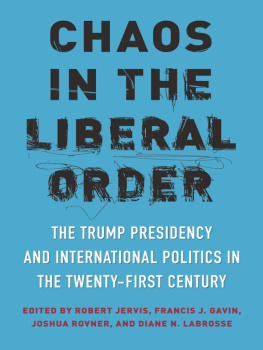
Trump
Alain Badiou
polity
First published in German as Trump. Amerikas Wahl Passagen Verlag, Ges.m.b.H, Vienna, 2017.
English-language edition published by arrangement with Eulama Lit. Ag.
This English edition Polity Press, 2019
Polity Press
65 Bridge Street
Cambridge CB2 1UR, UK
Polity Press
101 Station Landing
Suite 300
Medford, MA 02155, USA
All rights reserved. Except for the quotation of short passages for the purpose of criticism and review, no part of this publication may be reproduced, stored in a retrieval system or transmitted, in any form or by any means, electronic, mechanical, photocopying, recording or otherwise, without the prior permission of the publisher.
ISBN-13: 978-1-5095-3609-2
A catalogue record for this book is available from the British Library.
Library of Congress Cataloging-in-Publication Data
Names: Badiou, Alain, author.
Title: Trump / Alain Badiou.
Description: Cambridge, UK ; Medford, MA : Polity, 2019. | Includes bibliographical references and index.
Identifiers: LCCN 2018046813 (print) | LCCN 2018060069 (ebook) | ISBN 9781509536092 (Epub) | ISBN 9781509536078 (hardback) | ISBN 9781509536085 (paperback)
Subjects: LCSH: Presidents--United States--Election--2016. | Trump, Donald, 1946- | Capitalism--Political aspects. | Elite (Social sciences)--Political activity. | Political sociology. | BISAC: POLITICAL SCIENCE / General.
Classification: LCC JK526 2016 (ebook) | LCC JK526 2016 .B34 2019 (print) | DDC 324.973/0932--dc23
LC record available at https://lccn.loc.gov/2018046813
The publisher has used its best endeavors to ensure that the URLs for external websites referred to in this book are correct and active at the time of going to press. However, the publisher has no responsibility for the websites and can make no guarantee that a site will remain live or that the content is or will remain appropriate.
Every effort has been made to trace all copyright holders, but if any have been overlooked the publisher will be pleased to include any necessary credits in any subsequent reprint or edition.
For further information on Polity, visit our website: politybooks.com
Publishers Note
The two lectures published in this book were originally delivered in English. The first was given by Badiou at the University of California, Los Angeles, on 9 November 2016, and was subsequently reworked by the author and delivered in French; the version here is based on the French text. The second lecture was given by Badiou at Tufts University in Boston on 17 November 2016.
Two Days after the Election of Trump
University of California, Los Angeles
Coming to speak to you this evening, and thinking about yesterday, about last night, when we learned the results of the presidential election, about Trumps success, I have had in mind a beautiful line of poetry by Racine: It was during the horror of a deep night. Perhaps Racine was contemplating the future, the election of Trump, which, little by little, as the hours passed, became undeniable, turning the depths of the election night into something horrible. And under these circumstances I recognized an obligation to speak to you about the horrible thing that has just happened in the deep California night, for this counter-event, this disaster, makes it impossible for me to stand here before you all this evening and speak to you about this thing, however interesting it may be, in purely academic terms. You are distressed, stricken, appalled, and I must take as my point of departure what happened yesterday throughout the course of the deep night.
As you might imagine, what happened was, for me, as for almost everyone, a sort of surprise, a bad surprise, and the overwhelming consequence at first was the triumph of affects: depression, fear, panic, etc. But philosophy teaches us that none of these affects is in any way a good response, for they instead testify and even pay tribute, negatively and from our side, to the victory of the enemy. We must therefore think beyond these inevitable affects, beyond fear, disappointment, and depression. We must reflect on the political situation today, the situation of our world, and respond rationally to a question that is indeed urgent and haunting: what must the contemporary world be such that last night could have turned into such a horror? How is it possible for someone like Trump to be elected president of the greatest power in the world, the United States of America? So my goal this evening is to present, if not a complete explanation, at least a clarification of the possibility of this distressing fact, as well as to propose, to submit for your discussion, certain thoughts as to how we must confront what happened in the deep, horrible night what we must do that would not be subject to the law of negative affects but that would take place on the level of thought, action, and political resoluteness.
I am going to begin with a very general overview, not of the situation in the United States but of the situation in the world as we know it today. What is our world, in which the election of Trump, but also other extremely negative and horrible facts, can come about?
I think we must start with the most obvious point, but also the most important one: the victory, on a worldwide scale, of global capitalism. It is on this point, first of all, that we must insist. Since the 1980s in other words, for forty years or so we have been witnessing the historic victory of global capitalism.
There are several obvious reasons for this victory. The most important, of course, is the complete failure of the great socialist states, first Russia, then China, and, more generally, the disappearance almost everywhere of the collectivist vision of the economy and of social laws, even in the form of a simple program. This disappearance extends even into the realm of theory, indeed of philosophy: today, Marxism is everywhere regarded as a thing of the past, as a relic of thoughts and conflicts that are no longer ours. The time is very distant in which Sartre could still declare that Marxism was the untranscendable horizon of our culture. In fact, Marxism is now considered the very epitome of a transcended ideology. And this point is not in the least secondary, for it means that the situation of the world today, since the 1980s, is that of a major change, not only of objective reality but also of active subjectivities.
For more than two centuries, from the French philosophes of the eighteenth century to the great leftist movements of the 1960s and 1970s, public opinion was divided between two opposite ways of thinking about the destiny of humanity. At first, there was the opposition between the republican vision of the state and monarchical despotism. But then it turned into the opposition between the liberal doctrine of the free market on the one hand and the different varieties of socialism and communism on the other.
For liberalism in the classic sense, private property is the key factor in the organization of society at the price of enormous inequalities, to be sure, but, in liberal thought, everything has its price. On the opposite side is the socialist or communist or, indeed, even anarchist path, in the most abstract sense, according to which the end of inequalities must be the fundamental goal of human political activity the end of inequalities, even if it requires a violent revolution.
We thus have on one side the supposedly peaceful, legal, constitutional vision of the indefinite continuation of something very old, going back to the Neolithic age, namely the organization of all wealth and of the entire means of production under the legal form of private property, protected by the police and their power, and conceived of as the very heart of social life and of humanity. And, on the other side, we have the conviction, going back to certain aspects of the French Revolution, according to which the continuity of humanitys historical existence, at least since the Neolithic revolution, must allow for a second fundamental break, by rejecting the domination of private property and, consequently, by doing away with inequalities, thanks to a collectivized organization of production and exchange.
Next page
